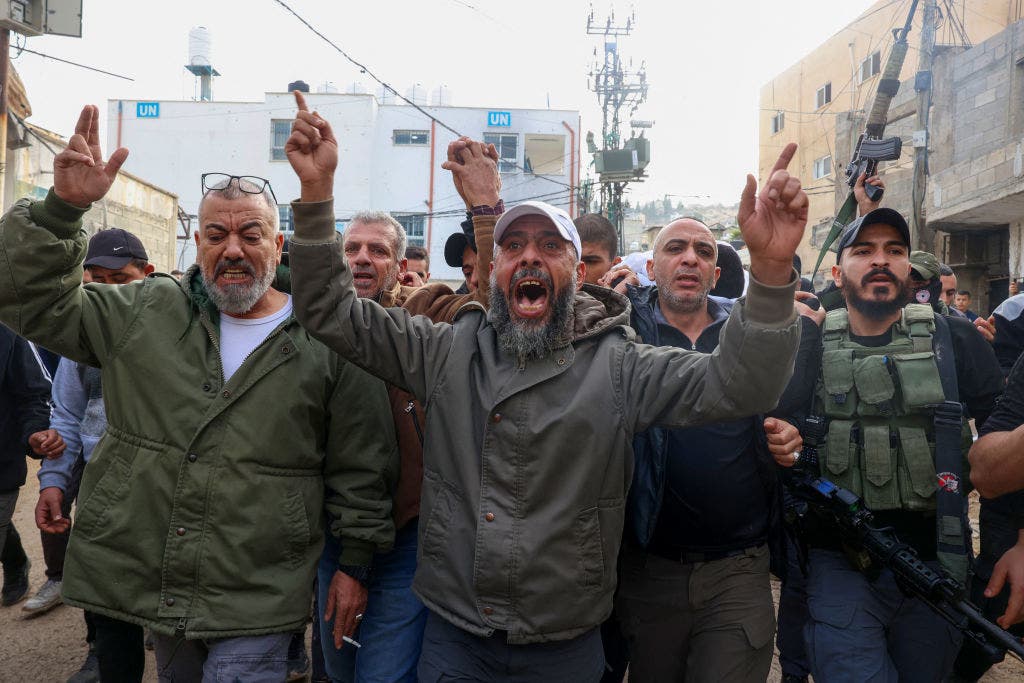The Palestinian Authority (PA) finds itself in a precarious position in Jenin, a northern West Bank city, as it attempts to quell the influence of Iran-backed militant groups. This operation, marked by violent clashes and escalating tensions, underscores the growing disconnect between the PA and local communities. Iran’s financial support of these factions, enabling them to acquire weaponry and bolster their operations, has prompted the PA to take action, blocking funds and cracking down on these groups. This intervention, while deemed necessary by the PA, carries significant risks and highlights the complex geopolitical landscape of the region, where Iran continues to support Hamas and Islamic Jihad. The PA believes that the current climate, following conflicts in Gaza and Lebanon, presents a more favorable environment for this confrontation, as public sentiment has shifted against further military engagement with Israel.
The United States, recognizing the PA’s precarious situation, has reportedly requested Israel’s permission to provide urgent military aid. This assistance, which would include ammunition, protective gear, armored vehicles, and other vital equipment, is contingent upon Israel’s approval. Historically, the U.S. has provided substantial financial support to the PA, ranging from $200 to $300 million annually. This aid, which was suspended during the Trump administration, has been reinstated under the Biden administration, reflecting a renewed commitment to supporting the PA. The request underscores the PA’s need for material support in its fight against these militant groups and the complex relationship between the U.S., Israel, and the PA.
The situation in Jenin has been escalating since October 7th, marked by an increased presence and activity of Hamas and Islamic Jihad, with significant Iranian backing. This heightened activity includes attempts to produce and launch rockets toward Israeli cities from Jenin, a troubling development that underscores the city’s evolving role as a hub for militant operations. Though these rocket attempts have so far been unsuccessful, they signify a dangerous trend and emphasize the growing complexities of the security situation. The PA’s operation in Jenin, including the killing of an Islamic Jihad commander, has further inflamed tensions within the city, particularly within the Jenin refugee camp, whose residents have expressed strong opposition to the PA’s intervention.
The recent killing of Yazid Jaysa, an Islamic Jihad commander, and other casualties resulting from clashes between PA forces and local militants have further exacerbated the existing tensions within Jenin, particularly within the refugee camp. The camp’s residents largely oppose the PA’s presence and operations, viewing them as an infringement on their autonomy and an escalation of the already volatile situation. This resentment has solidified resistance against the PA, creating a formidable challenge for its efforts to reassert control and stability within the city.
The PA’s attempts to enter and control the Jenin refugee camp have been met with fierce resistance. The militants within the camp, many of whom are openly hostile toward the PA, pose a significant obstacle to the PA’s objective of restoring order. The PA forces, despite positioning themselves outside the camp, are essentially in a stalemate, unable to advance or retreat. This impasse highlights the PA’s weakened authority and the escalating power of the militant factions within Jenin. The situation underscores the complexities and challenges facing the PA in its attempt to assert control over areas where its authority has been significantly eroded.
The timing of the PA’s operation in Jenin coincides with broader regional instability, including the ongoing conflict in Gaza and the aftermath of the war in Syria. Some observers suggest that the fall of Syrian President Bashar al-Assad may have influenced PA President Mahmoud Abbas’s decision to take action in Jenin, driven by a desire to avoid a similar fate. Abbas, facing a potential erosion of his own authority, likely felt compelled to act decisively in Jenin to demonstrate his control and prevent a further deterioration of the PA’s influence in the West Bank. The operation is also seen as an attempt to strengthen the PA’s standing ahead of potential political shifts in Gaza, a territory the PA lost control of to Hamas in 2007. By demonstrating its ability to restore order in the West Bank, the PA aims to bolster its legitimacy in any future political arrangements for Gaza. However, experts are skeptical about the PA’s ability to regain control in Gaza, citing the deeply entrenched Hamas rule and the substantial changes in demographics and political sentiment over the past 17 years. While the violence in Jenin is a serious concern, it is not expected to spread to other parts of the West Bank. The general sentiment outside of Jenin is against further conflict, with residents of cities like Ramallah and Hebron wary of replicating the Gaza situation. The situation in Jenin remains contained, but it serves as a critical test of the PA’s ability to maintain control within its territory and navigate the complex regional dynamics.

